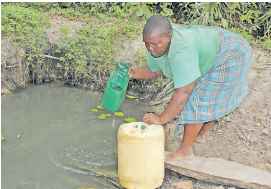
Deep in Shimba Hills, Kwale county, water scarcity has become a relentless struggle for residents of Likoni village.
Despite the region’s lush green forests and hilly terrain, the community relies on a single, overburdened well for their daily water needs.
The well, often murky and polluted, is a lifeline for the village, but one that frequently falls short. Fetching water is no ordinary chore for the people of Likoni—it’s a perilous journey.
Residents must navigate steep, rugged hills and dense forests teeming with wildlife, including snakes and buffaloes.
Each trip is a gamble, with the risk of animal attacks looming large. Christine Mumbua, a resident, said they have to endure treacherous treks through the wild only to return with barely enough for their families.
“The area is so hilly that pushing a wheelbarrow is impossible. We have no choice but to carry jerricans and buckets of water on our backs and heads,” she said.
Mumbua said navigating the steep, rugged terrain to reach the small well is an arduous task. Women are forced to wake up as early as 4 am to fetch water.
Mumbua said apart from distance, residents consume the unsafe water since they cannot afford purifiers. The consequences are devastating, particularly for women and children, who often suffer from stomach and urinary-related ailments.
“Our children complain of stomach pain and we know it’s because of the water, but there’s nothing we can do,” she said with a tone of helplessness.
Mumbua said residents battle severe illnesses, including kidney problems.
Harusi Nzao said sometimes the water table goes down and in extreme cases the well dries up. This forces them to trek to another village, a grueling journey that doesn’t guarantee a safe supply.
She said the relentless search for water consumes valuable time and they are left with little time to engage in other productive activities.
“Oftentimes, we spend so much time fetching water that we can’t do anything else,” Nzao said.
To get enough water, one has to make more than three trips, and by the time they finish, it’s already midday.
Nzao said the daily grind of trekking back and forth robs residents of the chance to focus on farming, work, or other income-generating activities.
She said this struggle has worsened poverty in the area. People sometimes have to wait for long hours for the small well to refill.
Fredrick Nzuki expressed deep concern over the ongoing water crisis, calling it a tragic reality in the modern era.
He said it’s heartbreaking that, at this point in time, the community still lacks access to clean drinking water. Nzuki urged the government to prioritise the needs of the villagers and take immediate action to address their plight.
“We appeal to those in charge to recognise our suffering and implement sustainable solutions to end this crisis,” he said.
Raymond Malelu said sharing water with animals is a violation of human rights and basic needs.
They are often forced to drink water contaminated with dirt from wild animals. He also pointed out that accessing tap water, though an option, is prohibitively expensive and insufficient to meet the needs of an entire family.
Malelu said the financial and logistical barriers are still a major hindrance for the community to secure safe and reliable water.








